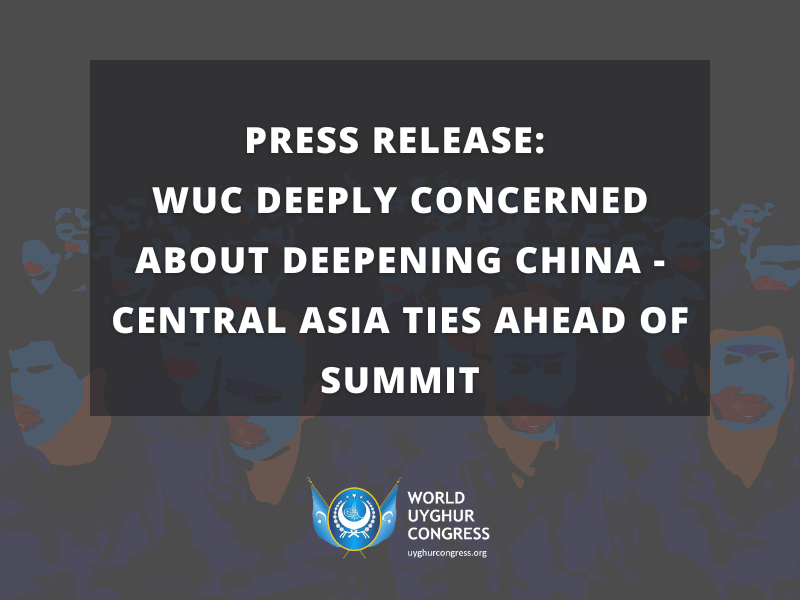PRESS RELEASE: WUC Deeply Concerned About Deepening China – Central Asia Ties Ahead of Summit

Press release – for immediate release
17.05.2023
Contact: World Uyghur Congress www.uyghurcongress.org
+49 89 5432 1999 or [email protected]
The World Uyghur Congress (WUC) alerts the Central Asian Governments’ responsibility to speak up, ahead of the China-Central Asia Summit, taking place on May 18-19 in Xi’an, China. The Summit is hosted by Chinese President Xi Jinping with his counterparts, Kassym-Jomart Tokayev of Kazakhstan, Shavkat Mirziyoyev of Uzbekistan, Emomali Rahmonov of Tajikistan, Sadyr Japarov of Kyrgyzstan and Serdar Berdimuhamedov of Turkmenistan. WUC strongly condemns the prioritisation of economic and trade relations as it continues to serve China’s interest of expansionism and consolidate its influence through the region by curtailing the ongoing Uyghur Genocide that is aggressively carried against the ethnic, cultural and religious kinships of Uyghurs living their next doors.
The inaugural meeting is the first major diplomatic event hosted by China and is taking place while Japan is hosting leading economies during the G-7 Summit in Hiroshima. China’s promoted agenda of boosting economic and security ties as well as strengthening cooperation on counter-terrorism is seen to dominate the China – Central Asia Summit.
In particular the Chinese propaganda narrative on ‘counter-terrorism’, is being used to criminalise legal forms of religious behaviour, leading to arbitrary detentions of millions of Uyghurs,Kazakhs, Uzbek, Kyrgiz and Tadjiks in concentration camps and subjecting them to systematic torture, rape, and forced labour. The commitment given by the governments of Kazakhstan, Kyrgyzstan Uzbekistan, and Tadjikistan to Turkic-Islamic values as well as their stance against Islamophobia is effectively being violated and invalidated by the Chinese government through the brutal persecution of Uyghurs and other Turkic people in East Turkistan
Despite Kazakhs being the second largest ethnic group subjected to the ongoing genocide of the Chinese government in East Turkistan, the Kazakh government vowed only last month “to contribute to building a China-Central Asia community with a shared future”. More so, the Kazakh government’s passport denial for Uyghurs who are seeking refugee in Kazakhstan are putting them in imminent danger and the risk of forcible repatriation to China. In the multilateral space, the Kazakh government along with other Central Asian governments have failed to uphold their commitment to human rights and universal values by condoning China’s genocidal policies against Uyghurs and Turkic people, and by opposing a resolution about a debate on the situation.
“Central Asian Governments have followed suit on the brutal treatment and intimidation the Chinese government displays against Uyghurs and other Turkic people”, says WUC President Dolkun Isa. ‘’These neighbouring countries have failed to live up to their commitments and to save Uyghurs, Kazakhs, Uzbek, Kyrgiz and Tadjiks from the ongoing genocide being committed against them.’’
Kazakhstan’s deepening strategic partnership with Beijing marks the 10th anniversary of the Belt and Road Initiative, which was first unveiled by Chinese President Xi Jinping as a Marshal Plan of the 21st Century in a speech at Kazakhstan’s Nazarbayev University in 2013. East Turkistan is one of the region’s most affected area by the Belt and Road Initiative (BRI) as a it positioned as key knot and main corridors of BRI expansion where many Uyghur landmarks, including religious shrines, mosques, historic sites and villages were demolished and Uyghur families removed from their ancient homes under this pretext.
WUC calls on Kazakhstan, Uzbekistan, Tajikistan, Kyrgyzstan and Turkmenistan to raise the atrocity crimes faced by Uyghurs, Kazakhs, Uzbek, Kyrgiz, Tadjiks and other Turkic people of East Turkistan during the Summit. The WUC reminds the Central Asian Governments of their obligations under the International Covenant on Civil and Political Rights (ICCPR), International Covenant on Economic Social and Cultural Rights (ICESCR) and the International Convention on the Elimination of All Forms of Racial Discrimination (CERD) as well as the common history, language, culture, and tradition that is shared between Uyghurs, Kazakhs, Kyrgyzs, and Uzbeks.

